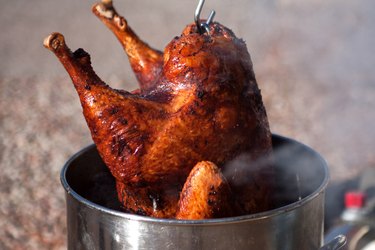
Roasting a turkey can take hours, so if you want a quicker option, you can deep-fry the turkey in oil instead. While peanut oil is the oil that is traditionally used, you can deep-fry the turkey in any oil that has a high smoke point.
Tip
According to the USDA Food Safety and Inspection Service, oils like safflower, soybean, sesame seed, grapeseed, canola, olive, corn, sunflower and peanut oil all have a high smoke point and are therefore safe for deep-frying. Each of these oils varies in nutrition and flavor.
Video of the Day
Video of the Day
Understanding Smoke Point, Cooking Temperatures by Oil Type
Smoke point is the technical term for the temperature at which oil starts to break down. That's not something you want, because it may start to give off a foul odor or taste. The USDA notes that turkey needs to be fried at a temperature of 350 degrees Fahrenheit, so you need to use an oil that has a smoke point higher than 350 F.
The USDA lists the smoke points of oils that can be used for deep-frying:
- Olive, sesame seed, corn and sunflower oil: 410 F
- Canola oil: 435 F
- Grapeseed oil: 445 F
- Soybean, safflower and peanut oil: 450 F
Remember that these are very high temperatures and that cooking oil is an extremely flammable liquid. To avoid burning yourself or starting a fire, be very careful while you attempt to deep-fry a turkey in oil. The USDA recommends keeping a fire extinguisher handy and making sure that no water comes in contact with the hot oil.
Read more: Is Sunflower Oil Healthy?
Deep-Fry a Turkey in Oil
The USDA lists a recipe and provides helpful tips for deep-frying a turkey in oil:
- Pick a smaller turkey: Buy a turkey that is under 12 pounds since smaller birds work better for deep-frying. If a small turkey won't suffice, try to buy multiple small turkeys instead of a single large one. If you do buy a large turkey, fry the parts, like the wings, breasts and legs, separately.
- Make sure it's thawed: If the turkey is fresh, store it in the fridge and cook it within a day or two. If it's frozen, account for 1 day of thawing for every 4 to 5 pounds. So, a 12-pound frozen turkey, for example, will take two and a half to three days to thaw and should be cooked within a day or two. The turkey should be completely thawed and shouldn't have any stuffing.
- Cook outdoors: Deep-frying food indoors is not recommended. A study published in the October 2015 issue of the journal Environmental Science and Pollution Research notes that deep-frying food releases harmful fumes and can be a significant source of indoor air pollution.
- Use a large cooking vessel: You will need a vessel big enough to fit the whole turkey. The turkey should be submerged in the oil and the oil should cover the turkey by 1 or 2 inches, without spilling over.
- Fry the turkey: Heat the turkey fryer oil to 350 F. Slowly lower the turkey into the oil. Cook the turkey for three to five minutes per pound. To check whether it's done, take it out of the turkey fryer oil and use a food thermometer to ensure that it has crossed 165 F. The innermost parts of the wing and thigh and the thickest part of the breast should all be above 165 F. If not, return the turkey to the oil to continue cooking.
- Serve the turkey: Once it's done cooking, take it out of the turkey fryer oil and place it on a tray lined with paper napkins. Wait 20 minutes to carve it, to give the juices a chance to set.
Read more: 7 Leftover Turkey Recipes to Be Thankful For
According to the USDA, a 100-gram portion of turkey has 199 calories, 26.85 grams of protein, 6.85 grams of fat and 6.17 grams of carbs. Turkey provides nutrients like potassium, phosphorus, B vitamins and selenium, but it may also contain a lot of sodium.
You probably already know that frying isn't the healthiest option, so try to opt for other cooking methods like roasting, baking or grilling as far as possible. A September 2012 study published in the journal Chemistry and Physics of Lipids notes that deep-frying food in oil at temperatures above 180 F causes a number of chemical reactions that can create unhealthy, toxic compounds in the food.
- USDA Food Safety and Inspection Service: “Deep Fat Frying and Food Safety”
- USDA: “Don’t Make Turkey Frying a Disastrous Situation This Thanksgiving”
- Environmental Science and Pollution International: “Characteristics of PAHs From Deep-Frying and Frying Cooking Fumes”
- USDA: “Turkey, Light Meat, Breaded, Baked or Fried, Skin Eaten”
- Chemistry and Physics of Lipids: “Chemical Alterations Taken Place During Deep-Fat Frying Based on Certain Reaction Products: A Review”